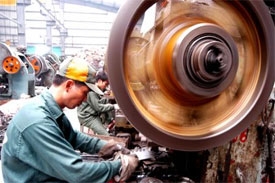Clear path for equitisation
 It is not easy for equitised enterprises to select strategic partners. How will Decree 59 tackle these issues?
It is not easy for equitised enterprises to select strategic partners. How will Decree 59 tackle these issues?
The new decree contains more flexible regulations on selling stocks in state-owned enterprises (SOEs) to strategic investors. It has new regulations on selling stocks via the put-through method prior to an initial public offering (IPO) with an aim to attracting experienced investors into SOEs after equitisation.
In case the IPO is held first, the stock selling price to strategic investors must not be lower than the successful floor auction price ,while in Decree 109/2009/ND-CP also relevant to convergence of SOEs into shareholding firms, the selling price must not be lower than the auction average price.
In case an auction is held among strategic eligible investors or in put-through transactions when the IPO is yet to take place, the selling price to strategic investors will be negotiable prices among relevant parties which must not be set lower than initial starting prices approved by the government.
 SOEs yet to undergo equitisation are mostly parent companies, big groups or corporations. Is that the case?
SOEs yet to undergo equitisation are mostly parent companies, big groups or corporations. Is that the case?
In fact, securities firms have grown stronger in both volume and their service quality. The stock exchanges have become professional and are now in a position to handle big IPOs to pare down unnecessary administrative procedures.
Newly-introduced Decree 59 erased regulations on auction registration with the MoF.
In respect to initial stock issuance underwriting, the insured price is that not lower than the initial stock price ratified by competent organisations. In underwriting cases involving foreign strategic investors they must strictly adhere to current regulations on foreign investor rights to purchase and pool capital into Vietnamese companies.
Under former Decree 109, underwriting method was just applied in initial stock issuances to certain investors who were entailed to satisfy certain conditions after the IPOs were held. In case of failed IPOs, underwriting organisations did not carry out this service.
So how to deal with unsold stocks?
Under current regulations, businesses can hold further auctions to sell unsold stock volumes. Since there is no auction deadline, firms had sold stocks many times, delaying the whole equitisation process as well as driving up expenses.
To remove the hurdle, Decree 59 figured out what were unsold stocks and required the SOE equitisation steering committee to further place unsold stock volumes for public offering via put-through method to lure investors.
If the unsold volume was not sold out, the steering committee must report to relevant competent organisations to continue with revisions on the charter capital structure to turn SOEs into joint stock firms. In the meantime, the SOE steering committee and representatives of state capital in equitised firms take charge of seeking shareholders conference approval to further sell unsold stocks to the public after the SOEs began to operate under the new joint stock model line with their approved equitisation roadmaps.
What the stars mean:
★ Poor ★ ★ Promising ★★★ Good ★★★★ Very good ★★★★★ Exceptional
Related Contents
Latest News
More News
- Banks roll out God of Wealth Day promotions (February 26, 2026 | 17:10)
- VinaCapital launches Vietnam's first two strategic-beta ETFs (February 26, 2026 | 09:00)
- Banking sector targets double-digit growth (February 23, 2026 | 09:00)
- Private capital funds as cornerstone of IFC plans (February 20, 2026 | 14:38)
- Priorities for building credibility and momentum within Vietnamese IFCs (February 20, 2026 | 14:29)
- How Hong Kong can bridge critical financial centre gaps (February 20, 2026 | 14:22)
- All global experiences useful for Vietnam’s international financial hub (February 20, 2026 | 14:16)
- Raised ties reaffirm strategic trust (February 20, 2026 | 14:06)
- Sustained growth can translate into income gains (February 19, 2026 | 18:55)
- The vision to maintain a stable monetary policy (February 19, 2026 | 08:50)

 Tag:
Tag:



















 Mobile Version
Mobile Version